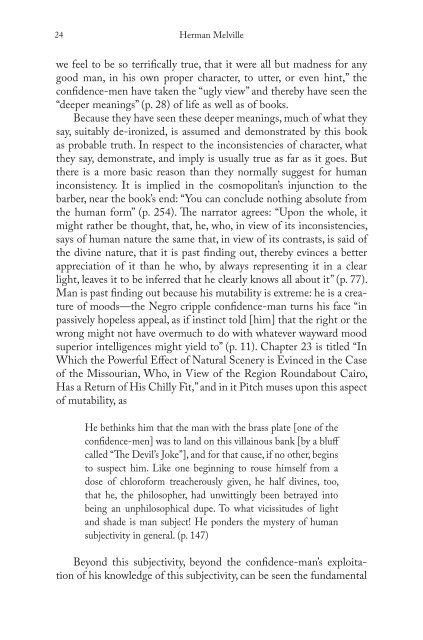Blooms Literary Themes - THE TRICKSTER.pdf - ymerleksi - home
Blooms Literary Themes - THE TRICKSTER.pdf - ymerleksi - home
Blooms Literary Themes - THE TRICKSTER.pdf - ymerleksi - home
Create successful ePaper yourself
Turn your PDF publications into a flip-book with our unique Google optimized e-Paper software.
24<br />
Herman Melville<br />
we feel to be so terrifi cally true, that it were all but madness for any<br />
good man, in his own proper character, to utter, or even hint,” the<br />
confi dence-men have taken the “ugly view” and thereby have seen the<br />
“deeper meanings” (p. 28) of life as well as of books.<br />
Because they have seen these deeper meanings, much of what they<br />
say, suitably de-ironized, is assumed and demonstrated by this book<br />
as probable truth. In respect to the inconsistencies of character, what<br />
they say, demonstrate, and imply is usually true as far as it goes. But<br />
there is a more basic reason than they normally suggest for human<br />
inconsistency. It is implied in the cosmopolitan’s injunction to the<br />
barber, near the book’s end: “You can conclude nothing absolute from<br />
the human form” (p. 254). Th e narrator agrees: “Upon the whole, it<br />
might rather be thought, that, he, who, in view of its inconsistencies,<br />
says of human nature the same that, in view of its contrasts, is said of<br />
the divine nature, that it is past fi nding out, thereby evinces a better<br />
appreciation of it than he who, by always representing it in a clear<br />
light, leaves it to be inferred that he clearly knows all about it” (p. 77).<br />
Man is past fi nding out because his mutability is extreme: he is a creature<br />
of moods—the Negro cripple confi dence-man turns his face “in<br />
passively hopeless appeal, as if instinct told [him] that the right or the<br />
wrong might not have overmuch to do with whatever wayward mood<br />
superior intelligences might yield to” (p. 11). Chapter 23 is titled “In<br />
Which the Powerful Eff ect of Natural Scenery is Evinced in the Case<br />
of the Missourian, Who, in View of the Region Roundabout Cairo,<br />
Has a Return of His Chilly Fit,” and in it Pitch muses upon this aspect<br />
of mutability, as<br />
He bethinks him that the man with the brass plate [one of the<br />
confi dence-men] was to land on this villainous bank [by a bluff<br />
called “Th e Devil’s Joke”], and for that cause, if no other, begins<br />
to suspect him. Like one beginning to rouse himself from a<br />
dose of chloroform treacherously given, he half divines, too,<br />
that he, the philosopher, had unwittingly been betrayed into<br />
being an unphilosophical dupe. To what vicissitudes of light<br />
and shade is man subject! He ponders the mystery of human<br />
subjectivity in general. (p. 147)<br />
Beyond this subjectivity, beyond the confi dence-man’s exploitation<br />
of his knowledge of this subjectivity, can be seen the fundamental

















